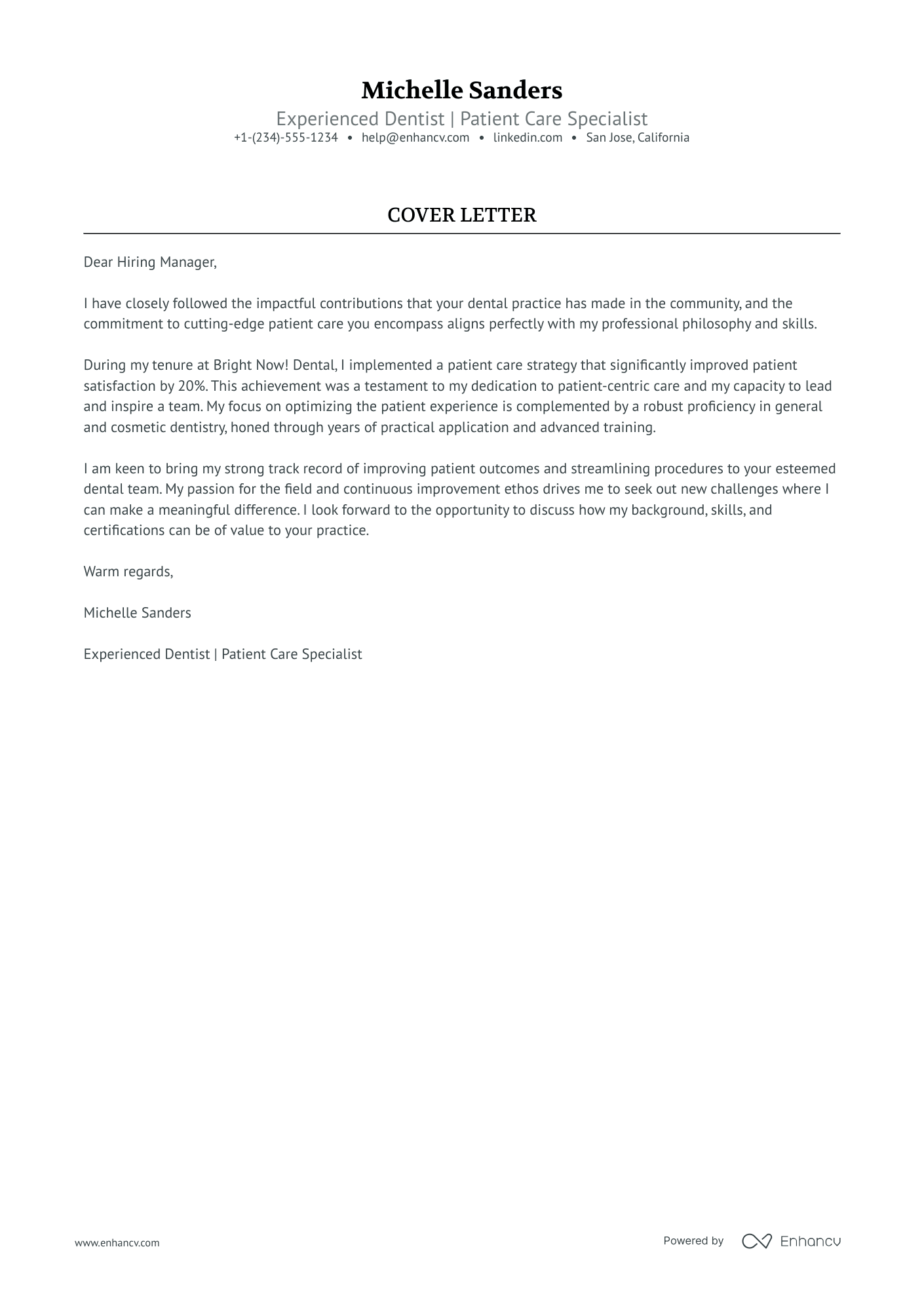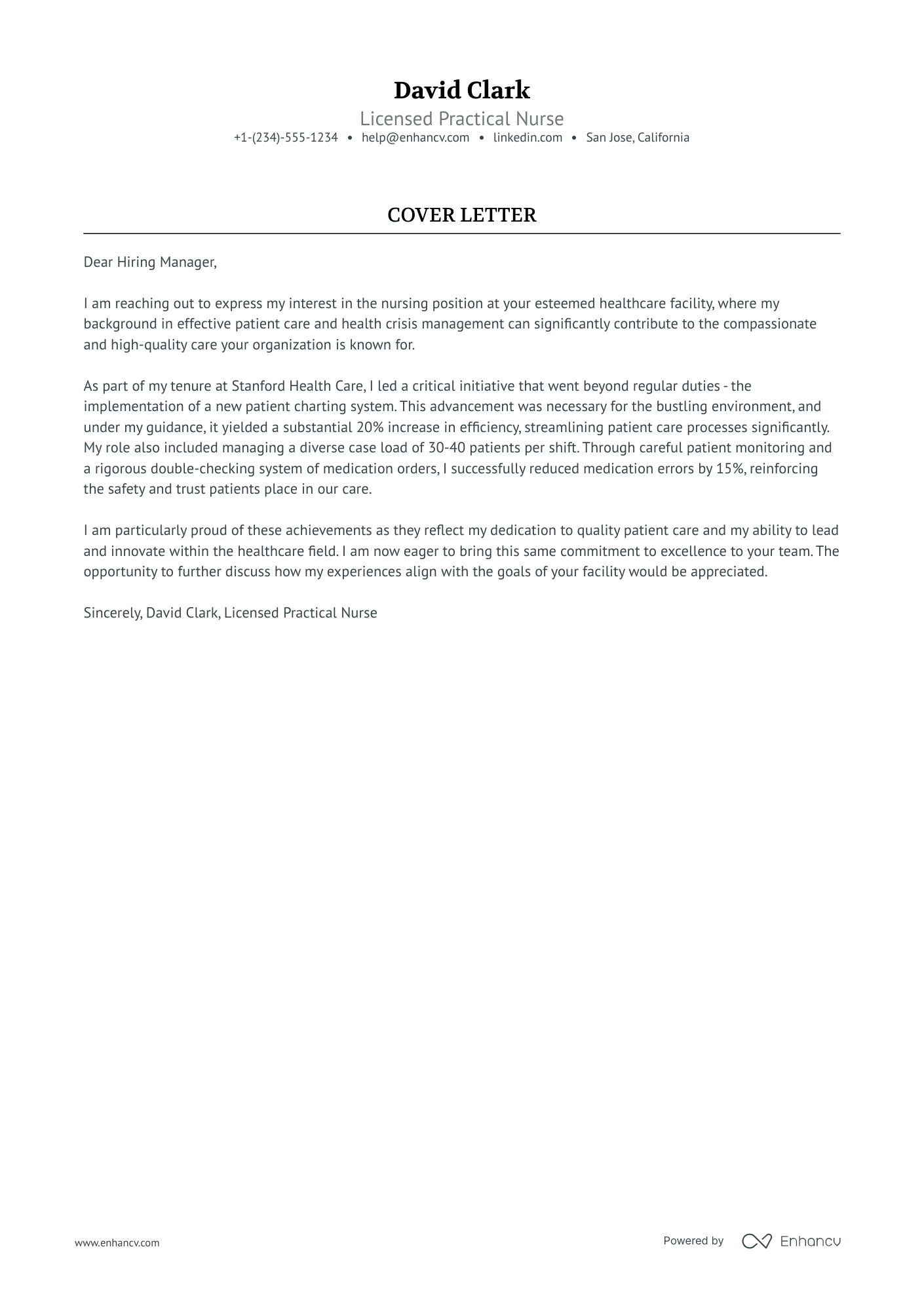Embarking on your job hunt, you've likely discovered that a polished dentist cover letter can set you apart. Crafting one that stands out means not echoing your resume, but instead weaving a compelling narrative around your crowning professional achievement. Striking the balance between formality and originality, steer clear of clichés to keep your reader engaged. Remember, brevity is key: your cover letter should capture attention within just one page. Let's navigate these common hurdles and ensure your cover letter shines.
- Introduce your profile to catch recruiters' attention;
- Use professional templates and examples to make sure your dentist cover letter follows the best industry standards;
- Settle on your most story-worthy achievement to shine a light on what makes your application unique;
- Write a dentist cover letter, even when you lack professional experience.
Ready to start with the basics: upload your resume to Enhancv's AI, below, to see the dentist cover letter it would write for you.
If the dentist isn't exactly the one you're looking for we have a plethora of cover letter examples for jobs like this one:
Drop your resume here or choose a file.
PDF & DOCX only. Max 2MB file size.
Dentist cover letter example
Michael Smith
Los Angeles, CA
+1-(234)-555-1234
help@enhancv.com
- Aligning experience with practice values: The cover letter connects the applicant's experience in patient education and process improvements directly with the dental practice's commitment to patient-centered care, demonstrating a shared ethos and the candidate's contribution potential.
- Demonstrating measurable achievements: By quantifying the impact of the applicant's initiatives (e.g., enhancing patient understanding by 25%, reducing wait times by 20%), the cover letter provides concrete evidence of the candidate's effectiveness and the positive outcomes they can elicit for the practice.
- Highlighting specialized skills: Mentioning a specialized role (Endodontist) immediately points to the candidate's expertise in a particular field of dentistry, underlining their qualification for the job and the specialized skills they bring to the practice.
- Proactive approach to contact: The cover letter closes with an invitation for the hiring manager to schedule an interview, showing the candidate's proactive approach and eagerness to engage further, and making the next step clear for the hiring manager.
Five tips on formatting your dentist cover letter
Do you want to make a good impression on recruiters and, at the same time, follow the best industry advice on writing your dentist cover letter?
Make sure to include the following:
- Header and Salutation;
- Introductory paragraph;
- Body paragraph;
- Closing paragraph;
- Signature (this one is up to you).
Remember to use the same modern, simple font for your dentist cover letter as you did for your resume (e.g. Lato, Rubik, etc.)
Ensure your dentist cover letter is single-spaced and is wrapped around a one-inch margin, like in our cover letter templates.
Once completed, use our cover letter builder to export your dentist cover letter in the best format to keep your information intact - PDF.
At the end of the day, your dentist cover letter won't be assessed by the Applicant Tracker System (ATS) software, but by the recruiters. Your information should thus be legible, organized, and follow a structured logic.
Writing a cover letter can take time. Skip the hassle with our free cover letter generator and make one in seconds.
The top sections on a dentist cover letter
Header: This section includes the dentist's contact information, the date, and the employer's contact information. It is essential for ensuring the recruiter knows whom the cover letter is from and how to contact the candidate for further communication.
Opening Greeting: A personalized greeting addressing the dental clinic's hiring manager or the dentist if known, conveys respect and attention to detail, which are critical traits for a dentist.
Introduction: The introduction should highlight the dentist's most notable achievements or experiences that are relevant to the job, grabbing the recruiter's attention and making them interested in reading further.
Professional Experience and Skills: Focused on the dentist's clinical skills, patient care abilities, and any specialty training, this section is crucial for demonstrating the dentist's competence and suitability for the position.
Conclusion and Call to Action: The closing paragraph should reiterate the dentist's enthusiasm for the position, thank the recruiter for considering the application, and include a proactive statement about looking forward to discussing how they can contribute to the clinic in an interview.
Key qualities recruiters search for in a candidate’s cover letter
- Clinical expertise and technical proficiency in dental procedures: Recruiters look for candidates who can demonstrate a strong foundation in dental skills and techniques, which is essential for delivering high-quality patient care.
- Detail-oriented nature: Precision is critical in dentistry, and being detail-oriented ensures that all procedures are carried out accurately, which is vital for successful outcomes and patient satisfaction.
- Excellent communication and interpersonal skills: The ability to clearly explain procedures, manage patient anxieties, and build rapport is crucial for a dentist to establish trust and retain patients.
- Commitment to continuous education: Dentistry is an evolving field, so a dedication to ongoing learning shows recruiters that a candidate is committed to staying up-to-date with the latest practices and technologies.
- Strong leadership and team collaboration abilities: Dentists often lead dental teams, so traits that demonstrate the ability to manage, motivate, and work well with others are highly valued.
- Compassion and patient-centric approach: Exhibiting empathy and a focus on patient comfort and well-being is imperative, as it helps in providing a positive dental experience and promoting oral health.
How to personalize your dentist cover letter greeting
Before you start writing your dentist cover letter, take the time to find out who is recruiting for the role.
Search for the recruiter's name on LinkedIn or the corporate website to address them personally in your dentist cover letter salutation.
What if you can't find out who's recruiting for the role?
Always aim to avoid the very impersonal "Dear Sir/Madam" - instead, opt out for "Dear HR Team" or "Dear Hiring Manager" to make a better first impression.
List of salutations you can use
- Dear Hiring Manager,
- Dear Dr. [Last Name],
- Dear Practice Manager,
- Dear [Name of Dental Practice] Team,
- Dear Members of the [Name of Dental Practice] Clinic,
- Dear Dr. [Last Name] and Team,
Your dentist cover letter intro: showing your interest in the role
On to the actual content of your dentist cover letter and the introductory paragraph.
The intro should be no more than two sentences long and presents you in the best light possible.
Use your dentist cover letter introduction to prove exactly what interests you in the role or organization. Is it the:
- Company culture;
- Growth opportunities;
- Projects and awards the team worked on/won in the past year;
- Specific technologies the department uses.
When writing your dentist cover letter intro, be precise and sound enthusiastic about the role.
Your introduction should hint to recruiters that you're excited about the opportunity and that you possess an array of soft skills, e.g. motivation, determination, work ethic, etc.
Choosing your best achievement for the middle or body of your dentist cover letter
Now that you have the recruiters' attention, it's time to write the chunkiest bit of your dentist cover letter.
The body consists of three to six paragraphs that focus on one of your achievements.
Use your past success to tell a story of how you obtained your most job-crucial skills and know-how (make sure to back these up with tangible metrics).
Another excellent idea for your dentist cover letter's middle paragraphs is to shine a light on your unique professional value.
Write consistently and make sure to present information that is relevant to the role.
Time to wrap up your dentist cover letter
Writing the closing paragraph of your dentist cover letter is just as important as the salutation.
You have to make it personalized to the job advert and recruiter.
Experienced professionals advise candidates to end with a request or reminder for follow-up. Write that you're grateful for the opportunity, and, at the same time, hint that you're available for the next steps of the process.
Otherwise, you could also conclude your dentist cover letter by facing the future. How do you see yourself, as part of the team? In particular, how would you settle in your new role in the first six months to a year?
Lacking experience: here's how to write your dentist cover letter
As a candidate with no experience, it's important to be honest from the get-go of your application.
Use your dentist cover letter to sell your unique talents. Choose an accomplishment from your academic background or your volunteer work to show the skills that are relevant to the role.
Focus on your career objectives and how you see the job to align with them. Be specific and, at the same time, realistic about where you picture yourself in five years.
Key takeaways
Writing your dentist cover letter has never been easier, so remember to:
- Select a dentist cover letter template that automatically meets industry formatting (e.g. has one-inch margins, is single-spaced, is in PDF, etc.);
- Make your dentist cover letter personal by mentioning the recruiters' first or last name;
- Within the introduction, describe what you like best about the company in no more than two sentences;
- Use your dentist cover letter body to tell a story of your greatest achievement, backed up by job-relevant skills and technologies;
- If you have no professional experience, be honest about it in your dentist cover letter, but also write about your unique talents.
Dentist cover letter examples
By Role







